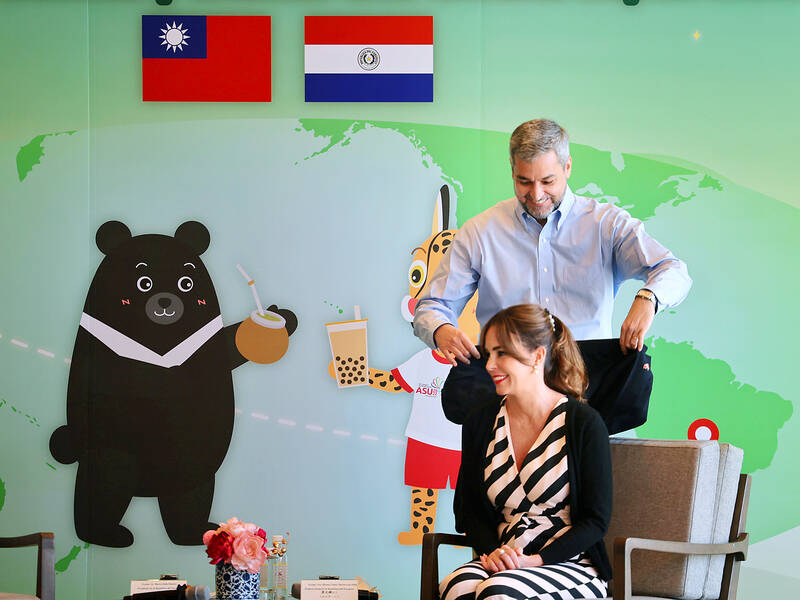Paraguayan President Mario Abdo Benitez yesterday denied that his country might switch recognition to Beijing after it holds elections in April, saying that severing diplomatic relations with Taiwan would be a “historic mistake.”
Abdo Benitez, who cannot run for re-election under the Paraguayan constitution, said he hopes his successor’s administration would not commit such an error.
Speaking at a news conference during a five-day visit to Taipei, Abdo Benitez said he believes that no matter who succeeds him, the election would not affect Paraguay’s more than 65-year friendship with Taiwan.

Photo: CNA
Paraguay is one of 14 countries that have formal diplomatic relations with Taiwan.
PRO-CHINA CANDIDATE
Former Paraguayan minister of public works and communications Efrain Alegre, the candidate of the Authentic Radical Liberal Party, has said that if he wins, Paraguay would switch recognition to Beijing, as it would boost economically important soy and beef exports.
Abdo Benitez said his country has never had diplomatic ties with the People’s Republic of China, adding that its Taiwan ties are not a major issue ahead of the election.
Statements candidates make on the campaign trail would not necessarily correspond with their policies after taking office, Abdo Benitez added.
“Nobody is going to dare to go ahead with a process of diplomatic rupture with the Republic of China, Taiwan,” he said, referring to Taiwan’s official name. “We are brotherly peoples, and we have a destiny together.”
Former Paraguayan minister of finance Santiago Pena, the candidate of Abdo’s Colorado Party, has said Paraguay’s relations with Taiwan would remain intact if he wins the election.
Paraguay’s Taiwan ties have been under pressure in the past few years, especially from the country’s beef producers and farmers, who see the relationship as an obstacle to gaining access to China, the world’s largest market for their products.
China targeting Taiwan’s allies has taken on broader geopolitical significance amid US concerns about Beijing expanding its influence in Latin America and the Caribbean, where many of Taipei’s diplomatic allies are located.

CHAOS: Iranians took to the streets playing celebratory music after reports of Khamenei’s death on Saturday, while mourners also gathered in Tehran yesterday Iranian Supreme Leader Ayatollah Ali Khamenei was killed in a major attack on Iran launched by Israel and the US, throwing the future of the Islamic republic into doubt and raising the risk of regional instability. Iranian state television and the state-run IRNA news agency announced the 86-year-old’s death early yesterday. US President Donald Trump said it gave Iranians their “greatest chance” to “take back” their country. The announcements came after a joint US and Israeli aerial bombardment that targeted Iranian military and governmental sites. Trump said the “heavy and pinpoint bombing” would continue through the week or as long

TRUST: The KMT said it respected the US’ timing and considerations, and hoped it would continue to honor its commitments to helping Taiwan bolster its defenses and deterrence US President Donald Trump is delaying a multibillion-dollar arms sale to Taiwan to ensure his visit to Beijing is successful, a New York Times report said. The weapons sales package has stalled in the US Department of State, the report said, citing US officials it did not identify. The White House has told agencies not to push forward ahead of Trump’s meeting with Chinese President Xi Jinping (習近平), it said. The two last month held a phone call to discuss trade and geopolitical flashpoints ahead of the summit. Xi raised the Taiwan issue and urged the US to handle arms sales to

State-run CPC Corp, Taiwan (CPC, 台灣中油) yesterday said that it had confirmed on Saturday night with its liquefied natural gas (LNG) and crude oil suppliers that shipments are proceeding as scheduled and that domestic supplies remain unaffected. The CPC yesterday announced the gasoline and diesel prices will rise by NT$0.2 and NT$0.4 per liter, respectively, starting Monday, citing Middle East tensions and blizzards in the eastern United States. CPC also iterated it has been reducing the proportion of crude oil imports from the Middle East and diversifying its supply sources in the past few years in response to geopolitical risks, expanding

Pro-democracy media tycoon Jimmy Lai’s (黎智英) fraud conviction and prison sentence were yesterday overturned by a Hong Kong court, in a surprise legal decision that comes soon after Lai was jailed for 20 years on a separate national security charge. Judges Jeremy Poon (潘兆初), Anthea Pang (彭寶琴) and Derek Pang (彭偉昌) said in the judgement that they allowed the appeal from Lai, and another defendant in the case, to proceed, as a lower court judge had “erred.” “The Court of Appeal gave them leave to appeal against their conviction, allowed their appeals, quashed the convictions and set aside the sentences,” the judges